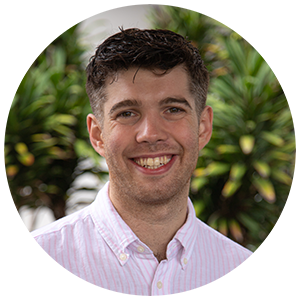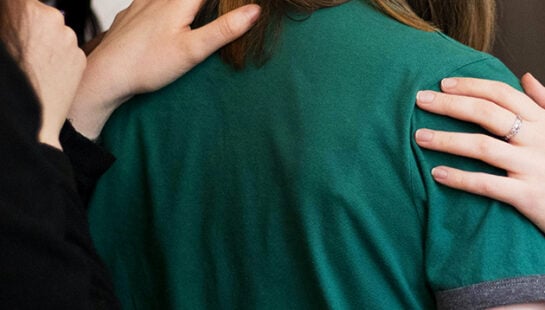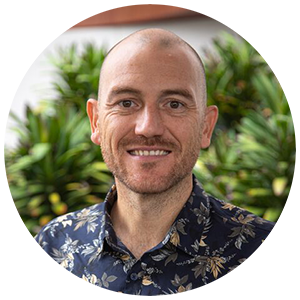When my wife, Mikyla and I moved into a rooming house, with 28 men at risk of homelessness, we knew life was about to change. It was peak lockdown (thanks, COVID), and we were increasingly worried about people in our community who didn’t have a place to call home.
Living alongside our friends in social housing meant we could do something tangible about homelessness and the isolation people on the margins of society can experience. When new residents arrived, we welcomed them in. When emergencies happened, we could provide immediate support.
The residents were not what we expected. Generally, they were friendly and welcoming. Despite incredibly diverse experiences of acute mental illness, injury, incarceration and trauma, for the most part they knew what it meant to experience injustice—and did the best they could with the resources they had to make life better. They knew a thing or two about connection, and what it takes to be present in another person’s life. And although I wouldn’t have previously called myself isolated or disconnected, it didn’t take long for me to realise I had a lot to learn.
One of those things I learnt—or perhaps, am still learning—is that it’s so easy to believe one thing, but to live out another.
A Compassion That Leads To Action
Perhaps you, like me, like the idea of being intimately connected to the diverse people around you. And maybe, like me, despite our belief or theology around the importance of compassion, you find yourself too easily surrounded by people who look (or think, or vote, or pray) like you do, or by people who don’t require you to be compassionate. It’s easy to hold an opinion but for that opinion to be disconnected from reality.
I’m often struck by that word: Compassion. From Latin, com = with. Passion = suffering. Literally translated, compassion asks us for what (or for whom) are we willing to suffer?
As a self-confessed optimist, I like to think we all value compassion. But when the rubber hits the road, how compassionate are we? Regularly, experiences with our residents remind me how easily I fall into apathy, impatience, and unforgiveness. Often, I see their poverty and am confronted by my respective wealth. It’s challenging—in a helpful and, I think, important way.
When it comes to homelessness, and so many other forms of poverty and injustice, I want things to change. But that requires something from me—both in the small decisions I make, but also in the way I choose to encourage or dismantle the unjust systems around me.
When the rubber hits the road, how compassionate are we?
As the aid and development arm of the Australian Baptist movement, we enable every Australian, if they accept the invitation, to love their global neighbour—and in doing so, express their love for God.
Romans 7:19-20
It’s almost as Paul languishes in Romans: ‘I do not understand what I do. For what I want to do I do not do, but what I hate I do . . . For I have the desire to do what is good, but I cannot carry it out.’
Individually, I only have so much influence over supply chains, government policy, or lawmaking. I’m not a judge. I might care about healthcare, but I’m not a nurse. There’s only so much I can do.
Hope In Collaboration
I love my work alongside people at risk of homelessness in Melbourne. Housing is a basic human right. This matters to me – and I believe the work I do matters. But no matter how many times I welcome a new resident to our home, or call a case worker to advocate for their needs, I haven’t personally changed the fact that there isn’t enough housing for our growing population, that commonwealth rent assistance is too low, or that support systems are complicated and difficult for people with mental illnesses to access.
These challenges—like so many wicked problems affecting people across the world—require both individual and corporate responses. They demand the collaboration of families, churches, businesses, governments, and organisations listening, exercising compassion, navigating compromise, and continuing to search for (and implement) solutions that work.
And That’s Why I Now Work With Baptist World Aid
When I joined the team at Baptist World Aid two months ago, I did so with great respect for the movement of Aussie Baptists who, over decades of working together in the dream of addressing poverty and injustice, haven’t given up hope.
When I came to know Jesus as a teenager in a local Victorian Baptist church, I did so inspired by the way Jesus led everyday people to make individual and collective decisions that led to real change: making that monthly donation, being careful about choosing where you buy your clothes, living alongside the homeless, befriending those who think differently to you (to learn, not to change them), and advocating for change where change was due. Both small and big actions mattered.
Australian Baptists have a history of embracing the theology that every believer has an active role to play in working towards a better world. Baptist World Aid is evidence of this. As the aid and development arm of the Australian Baptist movement, we enable every Australian, if they accept the invitation, to love their global neighbour—and in doing so, express their love for God.
And we do it in partnership: with individuals, with Government, with Churches, with local Christian Partners. Most importantly, I think, we do this with Jesus.
The Baptist World Aid statement goes ‘We dream of a world where poverty has ended, and all people enjoy the fullness of life God intends’.
In small and big ways, we get to be part of that.
What an honour. What a humbling privilege.



 Sienna Corkill,
Sienna Corkill,

 Ed Devine
Ed Devine